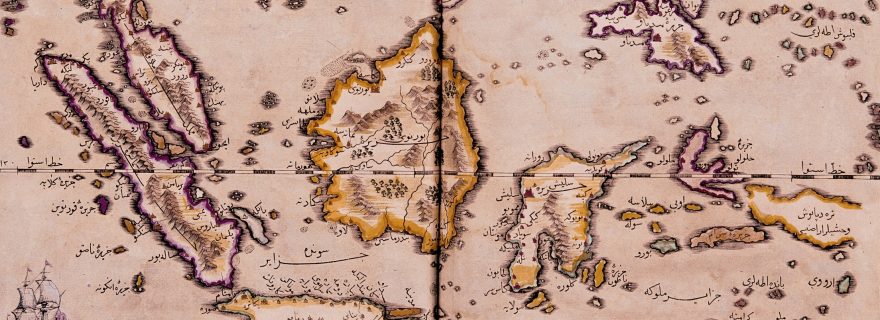Towards a book history of the Indian Ocean world
The circulation of texts across borders before the printing press remains largely unexplored. The Indian Ocean world is a case in point: it reveals many fascinating life stories of Islamic books.
Manuscripts were an important commodity sought after across the oceanic highway from Southeast Africa to Southeast Asia. Not only were they objects of learning, but also of diplomacy, rituals, treatment, plunder, gifts, and social status.
Studies on the circulation of books across Asia and Africa – and the Indian Ocean littoral that bound them – mainly focus on the mobility of printed books and related technologies. The circulation of texts before the printing press, however, remains largely unstudied.
During the archival and ethnographic research I conducted for my doctoral dissertation on the transmission of Islamic legal texts across the Eastern Mediterranean and the Indian Ocean world between the thirteenth and nineteenth centuries, I observed a great depth and breadth of unpreserved and unstudied private and official collections of thousands of Islamic manuscripts in South Asia alone. While the collections in Southeast Asia have been considerably catalogued and preserved, their South Asian counterparts continue to be neglected and poorly maintained.
Collectors’ stories
The story of the sixteenth century Āsaf Khan illustrates this. Āsaf Khan was a vizier of the sultan of Gujarat in present-day western India, but once the Mughal Empire conquered Gujarat in 1535, he escaped to Mecca where he found a good company of scholars, writers, and noblemen from Egypt, Persia, the Hijaz, and Turkey. Through them he collected many manuscripts.
Meanwhile a new sultan regained the kingdom in Gujarat. He requested Āsaf Khan to come back home. Khan thus packed all his belongings and set off for Gujarat in 1546, after ten years of exile in Mecca. Unfortunately, the sea was rough and his ship wrecked at the Malabar Coast on the southwestern shore of the Indian subcontinent. Khan somehow managed to get ashore, but all his manuscripts were lost. Among his greatest sorrows was his loss of an Arabic manuscript called al-Mishkāt.
Khan was cast ashore at the port of Mangalore, the city where Abraham Ben Yijū, a Jewish merchant, had collected manuscripts back in the twelfth century, trying to get his hands on even a single scrap of paper. Several of the documents collected by Abraham Ben Yijū have been stored in the Geniza in Cairo, leaving contemporary scholars astonished by his use of each and every bit of paper he collected.
In Yemen, Abraham Ben Yijū’s business partner Maḍmūn Bin David also traded in books and sent manuscripts to other parts of the world. In a letter to his counterpart in Egypt, Maḍmūn Bin David once asked: “Buy for me any fine copies of useful books you can lay your hands on and kindly send them to me,” together with the “medical writings of my lord the Rayyis,” Maimonides.
Circulation of manuscripts
Āsaf Khan, Abraham Ben Yijū and Maḍmūn Bin David all represent a large pattern of the Indian Ocean world in which books were in constant move. It is fascinating to note the stories of their circulation across borders and the changes in meaning from time to time and place to place within the littoral.
The arrival of the first copy of a manuscript from a distant place was often highly celebrated. People gathered around to see the new manuscript and even organized feasts. Not only books travelled from place to place; but also the stories, dreams and myths surrounding them, as well as cases of forgery and plagiarism.
In the early nineteenth century one Sulayman bin Abdullah Qaitali finished copying an Egyptian legal text “aboard a ship of Sayyid Husain of Bombay anchored at the Calicut sea,” as the colophon of one manuscript now kept at the National Library of Indonesia tells us. His case shows how scholars, students and scribes spent their time during the long voyages across the oceans.
With the European colonial expansion and the advent of the printing press, the extent of such circulations increased. The Sultan of Makassar, the provincial capital of South Sulawesi in Indonesia, ordered books from the Dutch East India Company in return for his favors to them in the seventeenth century.
It is necessary to explore the circulation of books and manuscripts as they were once the cultural cornerstones of many societies. We need to study the material and cultural features of their textual authorship, production, circulation, reception, uses and abuses, collection, preservation, markets, and institutions in the transregional realm of the Indian Ocean littoral. Such a book history of the Indian Ocean world will reveal several fascinating and complex aspects of Asia’s, Africa’s and Europe’s cultural pasts and connected histories.



1 Comment
In Mauritius Maulana Thanawi Behesti Zewar had a great impact on Islamic education.This is an area which has hardly been touched in reseach in Mauritius.